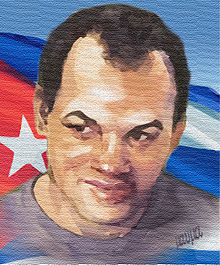- Orlando Zapata
-
Orlando Zapata Tamayo 
Born May 15, 1967
Santiago de Cuba, CubaDied February 23, 2010 (aged 42)
Havana, CubaCause of death starvation Nationality Cuban Known for Political Activism Orlando Zapata Tamayo (May 15, 1967[1] – February 23, 2010) was a Cuban mason, plumber, and political activist and prisoner[2] who died after fasting for more than 80 days.[3]
Contents
Political life
Political affiliation
Zapata was a member of Movimiento Alternativa Republicana (Republican Alternative Movement) and Consejo Nacional de Resistencia Civil (National Civic Resistance Committee).
Imprisonment
Zapata was arrested on December 6, 2002 by agents of the Cuban police on charges of contempt, for which he was imprisoned for over three months. On March 20, 2003, 13 days after he was freed, he was arrested for a second time during a crackdown on dissidents and sent to the Kilo 7 prison in Camagüey. At the time of his arrest, he was participating in a hunger strike organized by the Assembly to Promote a Civil Society, taking place at the home of Marta Beatriz Roque Cabello.[2] The hunger strike was meant as a petition for the release of several comrades. He was charged with contempt, public disorder, and disobedience and sentenced to 36 years in prison after several judicial processes.[4] As a result, Amnesty International recognized him as a prisoner of conscience.[2][5][6]
However, an article in the independent socialist journal Monthly Review claims that he was arrested and convicted several times for "disturbing the peace, two counts of fraud, public exhibitionism, injury and possession of non-firearm weapons" since June 1990.[7] It also claims that in 2000, Zapata fractured the skull of Leonardo Simon using a machete[7] and that his criminal record did not involve any political actions. In addition, it states that it was only after his imprisonment that his mother approached government opposition groups.[7]
Hunger strike and death
On either December 2 or 3, 2009, Zapata began a hunger strike[8] as a protest against the Cuban government for having denied him the choice of wearing white dissident clothes instead of the designated prisoner uniform, as well as denouncing the living conditions of other prisoners. As part of his claim, Zapata was asking for conditions comparable to those that Fidel Castro had while incarcerated after his 1953 attack against the Moncada Barracks.[9] For their part, the Cuban government stated he refused food because authorities wouldn't put a TV set, a stove and a phone in his cell.[10]
During the hunger strike Zapata refused to eat any food other than his mother's, who visited him every three months. According to the U.S.-based opposition group Cuban Democratic Directorate, prison authorities then denied Zapata water, which led to his deteriorated health and ultimately kidney failure.[8]
Zapata persisted in the hunger strike and was admitted to the Camagüey Hospital at an unspecified date, where he was given fluids intravenously against his will. On February 16, 2010 his condition worsened and he was transferred to Hermanos Ameijeiras Hospital in Havana,[11] where he ultimately died on February 23, 2010 at approximately 3:30 pm EST.[3]
It was the first time that an opponent of the Cuban government died during a hunger strike since the 1972 death of Pedro Luis Boitel.[12]
On March 16, 2010 an open letter condemning the Cuban government for the unjust incarceration of Orlando Zapata Tamayo and asking for the release of other political prisoners was posted in an internet blog. In less than a week the letter had obtained over 30,000 signatures. Among the signatories are prominent intellectuals from both the left and right of the political spectrum.[13]
Cuban government's response
President Raul Castro took the "unprecedented step" of expressing public regret about the death of Zapata.[10] During his remarks, he said Zapata was treated by top doctors and denied he was tortured.[10] Cuban state television also aired a report where doctors who treated Zapata, said they tried to get him to eat, with Dr. Maria Ester Hernandez stating:
"We explained to him the consequences of his decision at every turn and how much he was endangering his life with this. But he kept it up."[10]Cuban state newspapers meanwhile described Zapata as a "common criminal falsely elevated to martyr status."[10]
References
- ^ "Payo Libre: Orlando Zapata". http://www.payolibre.com/PRESO-%20Orlando%20Zapata.htm.
- ^ a b c "Orlando Zapata Tamayo". netforcuba.org. http://www.netforcuba.org/cubapp/Prs/OrlandoZapataEN.htm.
- ^ a b "BBS News: Americas". BBC News. February 24, 2010. http://news.bbc.co.uk/2/hi/americas/8533350.stm. Retrieved May 20, 2010.
- ^ Muere el disidente Orlando Zapata Tamayo tras 86 días de huelga de hambre, El Mundo
- ^ "Newly declared prisoners of conscience". Amnesty International. 29 January 2004. http://www.amnesty.org/es/library/asset/AMR25/002/2004/es/3453cf2b-d648-11dd-ab95-a13b602c0642/amr250022004en.pdf.
- ^ "Síntesis Biográfico de Orlando Zapata Tamayo (Spanish)". payolibre.com. http://www.payolibre.com/PRESO-%20Orlando%20Zapata.htm.
- ^ a b c Cuba, the Corporate Media, and the Suicide of Orlando Zapata Tamayo by Salim Lamrani, Monthly Review Zine, March 3, 2010
- ^ a b Zapata Tamayo translado: muy cerca de la muerte
- ^ The Prison Letters of Fidel Castro, by Ann Louisse Bardach and Luis Conte Aguero
- ^ a b c d e Cuba TV Report Denies Gov't let Hunger Striker Die By Will Weissert, Associated Press, March 1, 2010
- ^ Hospitalizado un disidente cubano en huelga de hambre, El País, February 17, 2010.
- ^ "Cuban dissident dies during hunger strike". http://www.miamiherald.com/2010/02/23/1496247/cuban-dissident-dies-during-hunger.html.
- ^ YO ACUSO AL GOBIERNO CUBANO
External links
 Media related to Orlando Zapata at Wikimedia CommonsCategories:
Media related to Orlando Zapata at Wikimedia CommonsCategories:- 1967 births
- 2010 deaths
- Cuban dissidents
- Cuban activists
- Cuban prisoners and detainees
- Cuban people who died in prison custody
- People who died on hunger strike
- Opposition to Fidel Castro
- Prisoners who died in Cuban detention
- Counter-revolutionaries
Wikimedia Foundation. 2010.
